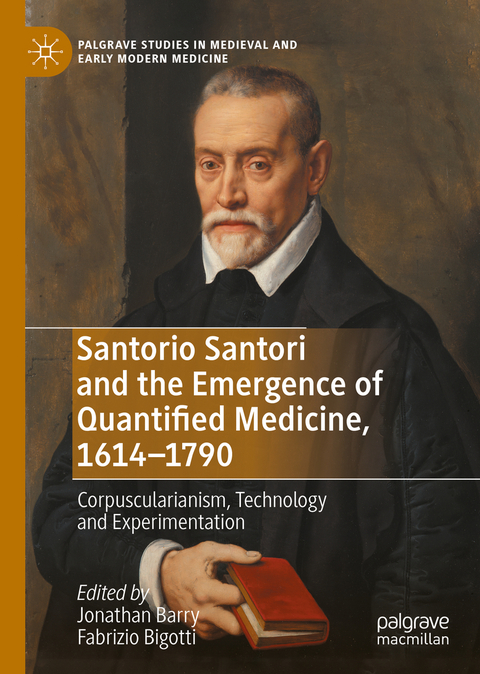
Santorio Santori and the Emergence of Quantified Medicine, 1614-1790
Springer International Publishing (Verlag)
978-3-030-79586-3 (ISBN)
This book examines the life and works of Santorio Santori and his impact on the history of medicine and natural philosophy. Reputed as the father of experimental medicine and procedures, he is also known for his invention of numerous scientific instruments, including early precision medical devices (pulsimeters, hygrometers, thermometers, anemometers), as well as clinical and surgical tools. The chapters in this volume explore Santorio's legacy through the seventeenth and eighteenth centuries. They highlight the role played by medical practitioners such as Santorio in the development of corpuscularian ideas, central to the 'new science' of the period, and place new emphasis on the role of the life sciences, chemistry and medicine in encouraging new forms of experimentation and instrument-making.
Chapters 1 and 2 are available open access under a Creative Commons Attribution 4.0 International License via link.springer.com.
lt;p>Jonathan Barry is Professor of Early Modern History at the University of Exeter in the UK, where he also served as Head of the School of Humanities & Social Sciences, and Dean of Taught Programmes. He is an early modern social and cultural historian, with particular interests in the history of science, medicine and witchcraft. He was co-founder of the Centre for Medical History at Exeter and is currently a Wellcome Trust Senior Investigator in Medical Humanities (2012-18).
Fabrizio Bigotti is a Wellcome Trust Fellow in the Centre for Medical History at the University of Exeter in the UK. Additionally, he is Corresponding Fellow of the Italian Academy for the History of Medicine and Honorary Research Fellow at the Studio Firmano for the History of Medicine and Science, both in Italy. He is Founder and Director of the Centre for the Study of Medicine and the Body in The Renaissance, as well as the Santorio Fellowship for Medical Humanities and the Science and Santorio Award for Excellence in Research. His areas of expertise cover the fields of history and philosophy of science, history of medicine and technology, and history of ancient philosophy, with a particular emphasis on the transition between the late medieval and early modern period.
1. Introduction - Fabrizio Bigotti and Jonathan Barry.- 2. 'Gears of an Inner Clock': Santorio's Theory of Matter and its Applications - Fabrizio Bigotti.- 3. The Uncertainty of Medicine: Readings and Reactions to Santorio between Tradition and Reformation (1615-1721) - Fabiola Zurlini.- 4. Daniel Sennert's Response to Santorio Santori in the Light of Chymical Atomism - William R. Newman.- 5. Atoms, Mixture, and Temperament in Early Modern Medicine: The Alchemical and Mechanical Views of Sennert and Beeckman - Elisabeth Moreau.- 6. Regius between Santorio and Descartes: The Quantification and Mechanization of the Passions in Seventeenth-Century Medicine - Fabrizio Baldassarri.- 7. Santorio and Leibniz on Natural Immortality: The Question of Emergence and the Question of Emanative Causation - Andreas Blank.- 8. Santorio Santori on Plague: Ideas and Experience between Venice and Naples - Vivian Nutton and Silvana D'Alessio.- 9. 'An inquisitive man, considering when and where he liv'd': Robert Boyle on Santorio Santori and Insensible Perspiration - Salvatore Ricciardo.- 10. Giovanni Alfonso Borelli and Santorio on the Explanation of Fevers - Fabio Zampieri.- 11. Bodies in Balance: Santorio's Legacy in Baglivi's Medicine - Luca Tonetti.- 12. Disputing Santorio: Johannes de Gorter's Neurological Theory of Insensible Perspiration - Ruben Verwaal.- 13. The Influence of Santorio Santori on the Dietetics of Carl Linnaeus - Luciana Costa Lima Thomaz.- 14. Weighing Authority: Lavoisier's and Séguin's Reassessment of Santorio's Experiments on Transpiration - Francesca Antonelli.
| Erscheinungsdatum | 19.03.2022 |
|---|---|
| Reihe/Serie | Palgrave Studies in Medieval and Early Modern Medicine |
| Zusatzinfo | XXVI, 421 p. 35 illus., 23 illus. in color. |
| Verlagsort | Cham |
| Sprache | englisch |
| Maße | 148 x 210 mm |
| Gewicht | 708 g |
| Themenwelt | Geisteswissenschaften ► Geschichte ► Regional- / Ländergeschichte |
| Schlagworte | Alfonso Borelli • Baglivi • Chymical Atomism • corpuscularianism • Daniel Sennert • experimentation • Galileo • Insensible Perspiration • Isaac Beeckman • Johannes de Gorter • Plague • Quantification • Santorio-Obizzi controversy • Theory of Qualities and Matter |
| ISBN-10 | 3-030-79586-1 / 3030795861 |
| ISBN-13 | 978-3-030-79586-3 / 9783030795863 |
| Zustand | Neuware |
| Informationen gemäß Produktsicherheitsverordnung (GPSR) | |
| Haben Sie eine Frage zum Produkt? |
aus dem Bereich


